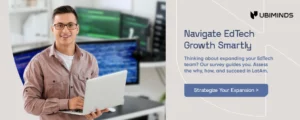How to Build High-Performance Software Teams for EdTechs
If you’re transitioning to a tech leadership position in an Education Technology (EdTech) company, there are several aspects specific to the industry to become aware of. Here, we compile a series of relevant info on the educational market’s needs and regulatory requirements and give a shout-out to the talented, knowledgeable tech professionals who have a transformative impact on education, enabling broader access, personalized learning experiences, skill development, and economic opportunities.
Content
Educational tech startups, online learning platforms, and educational software companies stimulate economic growth and innovation. On the one hand, they drive entrepreneurial opportunities, job creation, and technological advancements. On the other, they promote lifelong learning by providing flexible education for people at all life stages. This fosters a culture of continuous learning with accessible opportunities. But how does Education Technology work behind the scenes, at product development levels?
How is Building EdTech Software Different from Other Industries?
Building EdTech applications can be different from building software for other industries due to the unique characteristics and requirements of the education sector. Here are some key differences:
#1 Disperse User Focus
EdTech software typically caters to diverse user groups, including students, teachers, administrators, and parents. Each user group has specific needs and expectations. Designing and developing EdTech software requires a deep understanding of the educational context, user workflows, and the ability to address the requirements of multiple stakeholders.
- Personalized Learning: Edtech platforms facilitate personalized learning experiences by leveraging adaptive learning algorithms and data analytics. Students can receive tailored instruction based on their individual needs, learning pace, and preferences. This personalized approach fosters better engagement, higher retention rates, and improved learning outcomes.
- Enhanced Teaching and Learning Experiences: Edtech tools provide educators with a wide range of resources that help to enhance their teaching practices. It enables interactive and multimedia-rich content delivery, collaborative learning environments, and real-time feedback mechanisms. These tools empower teachers to create dynamic and engaging lessons, increasing student participation and comprehension.
| Other Industries
Building project management software, for instance, primarily focuses on the needs of project managers, team members, and stakeholders. The emphasis is on features like task assignment, collaboration tools, project tracking, and reporting. |
EdTech
There’s added complexity. When building a learning management system (LMS), you need to consider the needs of students, teachers, and administrators.
|
#2 Pedagogical Considerations
Unlike general software, EdTech often integrates instructional methodologies and pedagogical approaches. Developers need to collaborate closely with educators to ensure that the software supports effective teaching and learning practices. Incorporating features like assessments, adaptive learning, multimedia content, and progress tracking are essential aspects of EdTech development.
| Other Industries
Developing software involves organizing data, managing pipelines, and tracking interactions. While user experience and data management are important, the focus is on something other than pedagogical principles. |
EdTech
Developing adaptive learning software involves incorporating algorithms that analyze students’ performance data to provide personalized learning paths. The software needs to adapt the content, pacing, and difficulty levels to suit individual student needs. |
In fact, Edtech platforms generate vast amounts of data on student progress, learning patterns, and performance indicators. Analyzing this data provides insights to educators, policymakers, and administrators, enabling evidence-based decision-making and targeted interventions to improve educational practices and policies.
#3 Privacy and Security
Educational software handles sensitive student data, such as personal information, grades, and learning analytics. Building EdTech requires strict adherence to privacy laws and security measures to protect student data. Compliance with regulations like the Family Educational Rights and Privacy Act (FERPA) or the General Data Protection Regulation (GDPR) may be necessary.
| Other Industries
Data privacy and security are important in many industries, and they often focus on safeguarding customer information, financial data, and sensitive business details. Stricter regulations like GDPR or HIPAA may apply, requiring companies to ensure secure data storage, controlled access, and transparent user consent. |
EdTech
Educational apps or platforms that collect student data need to comply with privacy laws such as FERPA in the United States or GDPR in Europe. Developers must implement robust security measures to protect student information and ensure data is securely transmitted, stored, and accessed. This is even more prevalent when dealing with minors. |
#4 Accessibility and Inclusivity
Edtech plays a crucial role in expanding access to education, especially in underserved or remote areas. It enables learners to access educational resources, courses, and expertise regardless of location. Online platforms, digital content, and virtual classrooms break down barriers to education, offering opportunities for lifelong learning and skill development.
Building EdTech requires a strong focus on accessibility and inclusivity. Educational software should be designed to accommodate learners with diverse needs, including those with disabilities. Compliance with accessibility standards like the Web Content Accessibility Guidelines (WCAG) is important to ensure equal access to educational resources.
| Other Industries
While accessibility is important in various industries, the specific needs and legal requirements for accessibility in educational contexts (e.g., Section 508 in the United States) make it a critical consideration in EdTech development. |
EdTech
Educational software needs to consider accessibility standards to ensure students with disabilities can access and interact with the content. This may involve providing alternative text for images, captions for videos, keyboard navigation support, and compatibility with screen readers. |
#5 Integration with Education Systems
Edtech tools provide educators with a wide range of resources and instructional aids to enhance their teaching practices. It enables interactive and multimedia-rich content delivery, collaborative learning environments, and real-time feedback mechanisms. These tools empower teachers to create dynamic and engaging lessons, increasing student participation and comprehension.
This said, EdTech software often needs to integrate with existing educational systems, such as learning management systems (LMS), student information systems (SIS), or online assessment platforms. Interoperability and compatibility with these systems are crucial for seamless data exchange and integration with the broader educational infrastructure.
| Other Industries
Integrating software in other industries may involve connecting with APIs, third-party tools, databases, webhooks, and more. |
EdTech
Building an assessment platform that integrates with an existing LMS requires compatibility with various assessment standards, data exchange protocols, and gradebook integration. The software should seamlessly integrate with the LMS, reducing administrative burdens for teachers and allowing data flow between systems. The complexity and specific integration needs in the education sector, such as standardized data formats like IMS Global Learning Consortium’s Learning Tools Interoperability (LTI), can pose unique challenges. |
#6 Continuous Learning and Improvement
Education is a dynamic field, and EdTech software needs to adapt to evolving teaching practices, curriculum changes, and emerging technologies. Building EdTech requires a mindset of continuous improvement and the ability to incorporate feedback from users, educators, and researchers to refine and enhance the software over time.
| Other Industries
Continuous improvement is important in all software development, the specific feedback channels and the need for ongoing collaboration with users is key. |
EdTech
Feedback loops with educators and students are essential for refining EdTech software. Conducting usability testing, gathering user feedback, and incorporating research findings into future iterations are crucial to align the software with evolving educational needs and emerging technologies. |
Overall, building EdTech requires a deep understanding of the education sector, collaboration with educators, and a user-centric approach to creating software that effectively supports teaching and learning processes while meeting the unique requirements of the education industry.
EdTech in a Nutshell: How Do EdTech Software Teams differ from Other Software Industries?
EdTech tools support continuing education, professional certifications, and upskilling, enabling individuals to stay competitive and relevant in a rapidly evolving knowledge-based economy. This means accumulating knowledge far beyond tech skills – business acumen, pedagogical knowledge, and empathy with users are core abilities to be developed.
Product, design, and engineering teams in EdTech companies often require specific configurations, traits, and competencies to effectively build educational software. Here are some ways in which these teams differ from those in other software industries:
- Deep Understanding of the Education Sector: Teams in EdTech need a thorough understanding of the education sector, including pedagogical principles, learning theories, and instructional design. They should be familiar with educational frameworks, curriculum standards, and assessment practices. This knowledge helps them align the software with the specific needs and goals of the education sector.
- Collaboration with Educators: EdTech teams must collaborate closely with educators, instructional designers, and subject matter experts to ensure the software meets educational objectives. They need to communicate effectively, listen to feedback, and translate pedagogical requirements into actionable product features. This collaboration helps create software that is relevant, engaging, and supportive of effective teaching and learning practices.
- User-Centric Design: EdTech teams should have a strong user-centric design approach. They must empathize with the diverse user groups in education, such as students with different learning styles, teachers with varying instructional preferences, and administrators with specific administrative needs. Understanding the workflows and pain points of these users allows teams to create intuitive interfaces, personalized experiences, and effective user journeys.
- Knowledge of Privacy and Security Regulations: EdTech teams must possess a deep understanding of privacy and security regulations specific to the education sector. They should be knowledgeable about laws like FERPA or GDPR and implement best practices to safeguard student data. This includes encryption, data anonymization, secure authentication, and compliance with data retention policies.
- Pedagogical and Assessment Expertise: EdTech teams should have a solid understanding of pedagogical and assessment methodologies. They need to develop features that support adaptive learning, formative and summative assessments, and data-driven insights for educators. Knowledge of learning analytics, learning management systems, and educational data standards is valuable to building effective educational software.
- Compliance and Standards Awareness: EdTech teams should stay up to date with compliance standards and educational data interoperability standards like LTI, Common Cartridge, or xAPI. They need to ensure their software adheres to accessibility guidelines like WCAG, as well as other regulations specific to the education industry. Compliance with such standards ensures compatibility, accessibility, and interoperability with other educational systems.
- Continuous Learning and Research: EdTech teams should have a mindset of continuous learning and research. They should actively seek feedback from educators, students, and researchers, and integrate the latest findings into their product development cycles. Keeping up with emerging technologies, educational trends, and advancements in learning sciences is crucial for building innovative and impactful EdTech solutions.
While some general software development skills are transferable, the unique characteristics of the education sector demand specialized knowledge and competencies from EdTech teams. By combining expertise in education, user-centric design, privacy and security, pedagogy, compliance, and continuous learning, these teams can create high-quality educational software that effectively serves the needs of students, teachers, and administrators.
Need help building and scaling your EdTech’s software team?
Are you a company in the EdTech industry seeking to build and scale your software team? Do you need assistance with recruiting top talent, hiring the right skill sets, managing performance, and staying compliant with industry-specific regulations? If so, you can transform your EdTech software team with our expert guidance.
Ubiminds’ team of specialists is here to help you navigate the complexities of hiring for Edtech software development. With our deep understanding of the education sector and expertise in building successful Edtech teams, we’re dedicated to helping you boost collaboration and achieve your goals.
By scheduling a call with our specialists, we can build a tailored service to tend to your context. Ubiminds can offer you:
- Talent Acquisition Expertise: Leverage our extensive network and experience in recruiting and hiring professionals with the skill sets essential for EdTech development. We’ll help you identify and attract the right candidates in LatAm – those who possess the unique combination of education, technology, and domain knowledge.
- Performance Management Strategies: Unlock the full potential of your EdTech team through effective performance management techniques. Our specialists will guide you in setting clear goals, establishing feedback mechanisms, and fostering a culture of continuous learning and improvement.
- Scalability and Team Development: As your EdTech company grows, our specialists will help you design scalable team structures, establish efficient workflows, and implement agile methodologies. We’ll work with you to create a culture of innovation and collaboration that propels your software development efforts forward.
- Compliance and Regulatory Guidance: Stay ahead of industry-specific regulations and ensure your EdTech software is compliant with data privacy, accessibility, and educational standards. Our experts will provide valuable insights and assist you in navigating the legal landscape to safeguard student data and meet compliance requirements.
Don’t miss out on the opportunity to transform your Edtech software team and drive your company’s success in the rapidly evolving education landscape. Schedule a call with our specialists today and let us support you in building and scaling your edtech software team to meet the unique demands of the industry. Together, we’ll shape the future of education through innovative technology solutions!

International Marketing Leader, specialized in tech. Proud to have built marketing and business generation structures for some of the fastest-growing SaaS companies on both sides of the Atlantic (UK, DACH, Iberia, LatAm, and NorthAm). Big fan of motherhood, world music, marketing, and backpacking. A little bit nerdy too!







